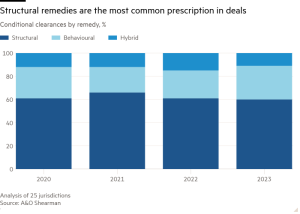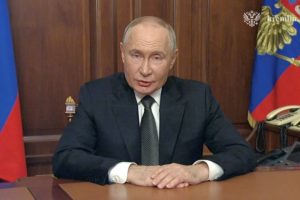Erdoğan has big plans, but the Kurdish problem keeps getting in the way
Unlock the Editor’s Digest for free
Roula Khalaf, Editor of the FT, selects her favourite stories in this weekly newsletter.
The writer is director of the Turkey programme at the Middle East Institute and author of ‘Erdoğan’s War: A Strongman’s Struggle at Home and in Syria’
Gunmen armed with explosives and assault rifles assailed the headquarters of Turkey’s state-run aerospace company near Ankara on October 23, in a terrorist attack claimed by the outlawed Kurdistan Workers’ party (PKK). The incident complicates President Recep Tayyip Erdoğan’s efforts to exploit the regional chaos that followed Hamas’s attack on Israel a year ago to advance his domestic and regional goals.
Erdoğan has been one of the harshest critics of the war Israel has been waging since last October. He branded Israel a terror state, compared its prime minister with Hitler and even suggested Turkey could be its next target. In reality, however, Erdoğan wants to trade on the war to achieve his own ends.
One challenge Erdoğan faces is that Turkey’s constitution does not allow him to run for re-election in 2028. Without a big enough parliamentary majority to change it, he needs support from the pro-Kurdish party to remain in power. To that end, Erdoğan recently initiated talks with the PKK’s imprisoned leader, Abdullah Öcalan. Under his plan, Öcalan would announce the PKK’s disbandment and walk free. To silence critics, Erdoğan uses Israel’s war as cover and argues that Turkey must stand strong against regional disorder by making peace with the Kurds.
A possible resumption of negotiations with the Kurds will help further Erdoğan’s agenda in the rapidly changing Middle East as well. Israel’s military strikes at the so-called Axis of Resistance, a network of Iran-backed armed groups including Hamas, Hizbollah and Syrian and Iraqi militias, have raised the possibility of an end to two decades of Iranian regional ascendancy. That is hardly something Erdoğan would lose sleep over.
Turkey and Iran have long vied for regional influence. In Syria, Iran supported Bashar al-Assad, its longtime ally, while Turkey threw its lot behind the opposition. Until recently, the consensus was that Erdoğan lost that battle. His efforts to topple the regime failed and Turkey is grappling with the consequences, including almost 4mn Syrian refugees on its soil. In a bid to manage a nationalist backlash against them, Erdoğan has pushed to restore diplomatic ties with Assad, hoping that with his help he can repatriate the refugees.
Assad has been dragging his feet to extract concessions, such as the withdrawal of Turkish troops from Syrian territory. However, changing regional dynamics could force Assad to finally shake hands with Erdoğan. Israel’s military campaign has weakened Assad’s allies, Iran and Hizbollah, and emboldened his foes, Isis and the opposition. At such a vulnerable time, Assad might want to improve ties with Erdoğan.
For Erdoğan, such a move would pave the way for co-operation on another issue. The PKK-linked Syrian Kurdish militia, a US partner in the fight against Isis, controls much of north-east Syria. Ankara considers the group a significant national security threat but expects the planned US withdrawal from Iraq, which could force a US exit from Syria as well, to leave it vulnerable to Damascus’s demands. Erdoğan wants to work with Assad to exploit that vulnerability and bring the areas in Kurdish hands back under Assad’s control. Erdoğan must hope the negotiations with Öcalan will drive the PKK’s Syrian offshoot to agree to such a deal.
The attack near Ankara, however, suggests things might be more complicated than Erdoğan had hoped. Some factions in the PKK oppose a deal with Turkey on Erdoğan’s terms, arguing a lasting solution requires addressing the Kurds’ key democratic demands. It is a concession an autocrat like Erdoğan is unlikely to grant. As long as the Kurdish problem remains his soft underbelly, the regional chaos is likely to create more problems for him than it solves.
#Erdoğan #big #plans #Kurdish #problem




